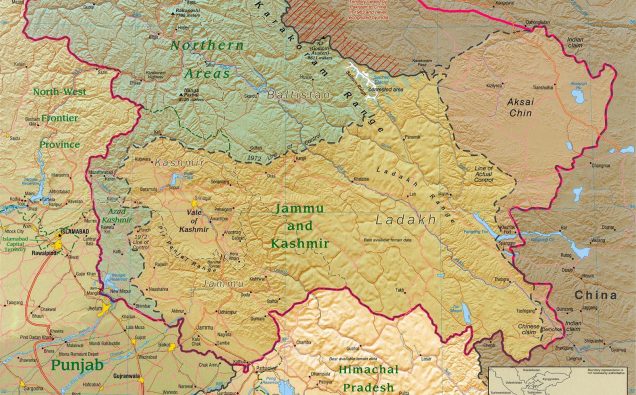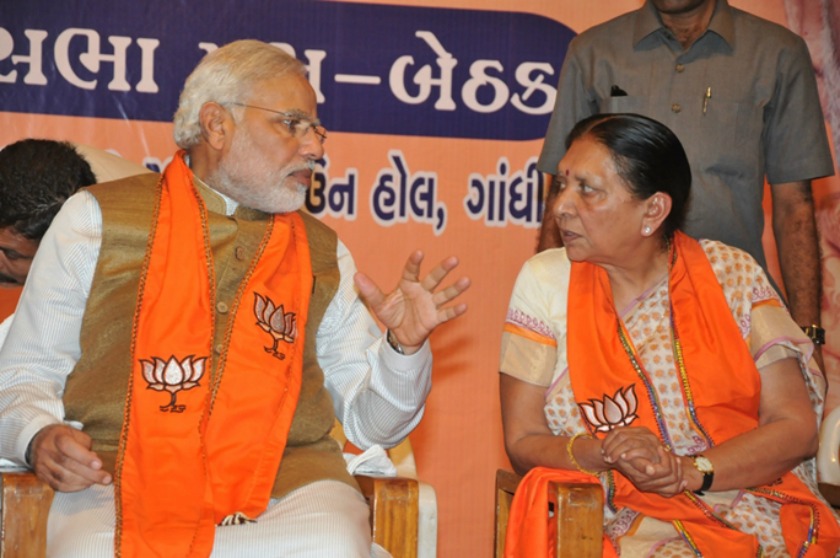
Kashmir region 2004 Photo: CIA/Wikimedia Commons
Amid exchange of fire across Kashmir’s Line of Control, uprising against Indian repression of the Kashmiris and the latest attacks on an Indian military base in the disputed region, Indian militant groups allied to the BJP government have resorted to jingoism against Pakistan.
Indian Defense Minister Nirmala Sitharaman has also joined the chorus of hawks, presenting war as a solution to what is going on in the Indian-held Kashmir.
New Delhi’s inability to address the crisis in Kashmir has again raised fears of the disputed territory turning into a flash-point.
In Pakistan, Defense Minister Khurram Dastgir has said the country would pay New Delhi back, if it chose the path of aggression, although Islamabad often urges dialogue as the way out of Kashmir conflict.
The vibes for peace in South Asia appear to be drowning deep in the nationalistiic noises.
Yet, there are political voices that are advising caution and the path of dialogue that has remained stalled throughout India’s nationalist Prime Minister Narendra Modi’s term – marked by rise of the militant groups that target Muslim and Christian minorities.
A voice of reason came to the fore at a literary event in Karachi, where Indian National Congress leader, Mani Shankar Aiyer, called for revival of dialogue between the two nuclear-armed neighbors.
The former minister, in fact, lamented at Karachi Literature Festival that the BJP-led New Delhi has not responded to Pakistan’s overture for peace dialogue.
India has not reciprocated Islamabad’s holding out an olive branch.
“There is only one way of resolving India-Pakistan issues and that is by uninterrupted and un-interruptible dialogue,” Aiyer said.
The Indian politician stated that he is “proud” of Pakistan for pursuing the policy of dialogue.
“And I am very proud and half very sad that this sentence of these three words has been accepted as Pakistan policy, but has not been accepted as Indian policy.”
He was referring to Pakistan’s stand and repeated calls for India to enter into a dialogue to resolve the outstanding issues including Kashmir.
In a state of paranoia after repeated attacks on military bases in Jammu and later in Srinagar, India warned Pakistan that it “will pay” for its “misadventure” .
At least six Indian soldiers were reported killed after fighters stormed the Sunjuwan army camp on Saturday. The three attackers were killed in the ensuing gun battle that continued for more than two days.
“Pakistan is expanding the arc of terror… We will be providing evidence to prove that the handlers are back in Pakistan and they are the mastermind, influencing all this … Pakistan will pay for this misadventure,” Nirmala Sitharaman, India’s defense minister, said on Monday.
Indian officials have blamed Jaish-e-Muhammad (JeM), for the Jammu attack, but Pakistan’s foreign ministry said in a statement the “Indian allegations are premature and inopportune.”
Mohammed Faisal, Foreign Office spokesperson, on Tuesday said India’s “tendency of apportioning blame to Pakistan, without a shred of evidence, is regrettable” and carries “no credibility”.
Independent analysts also see a historical pattern in Indian outbursts against Pakistan whenever the insurgency or freedom movement in Kashmir gains strength and gets out of control.
Every few weeks, fears of another South Asian conflict soar. In India the militant outfits like RSS and BJP leaders, espousing Hindutva, beat war drums which the media reports happily. In Pakistan, leaders respond to Indian threats with a telling response.
Meanwhile, Kashmir remains in the grip of insurgency and widespread unrest, and the chief minister of the Indian-controlled Kashmir, Mehbooba Mufti is also calling for dialogue.
“We fought and won all wars against Pakistan but even now there is no solution other than dialogue, till when will our jawans and civilians keep dying,” Mufti said in the Jammu and Kashmir assembly, according to a Times of India report.
Although Mufti has no control over forces raising India’s jingoistic noises, her point has a logical basis rooted in lessons of history. Several wars and conflicts have failed to resolve the longstanding Kashmir dispute, and any conflagration would fail to do so now of in the future as well. Therefore, sooner the two countries listen to voices of peace, the better for the region and the United States, which is engaged militarily in Afghanistan. A breakout of conflict between Pakistan and India will badly hurt peace and stability efforts for Afghanistan, and throw the entire region into turmoil.
But will Modi be willing to resume dialogue with Pakistan? His use of Pakistan tensions in the past several elections and quite possibly in the next elections give little reason for hope that South Asian rivals would revive peace dialogue anytime soon.



















